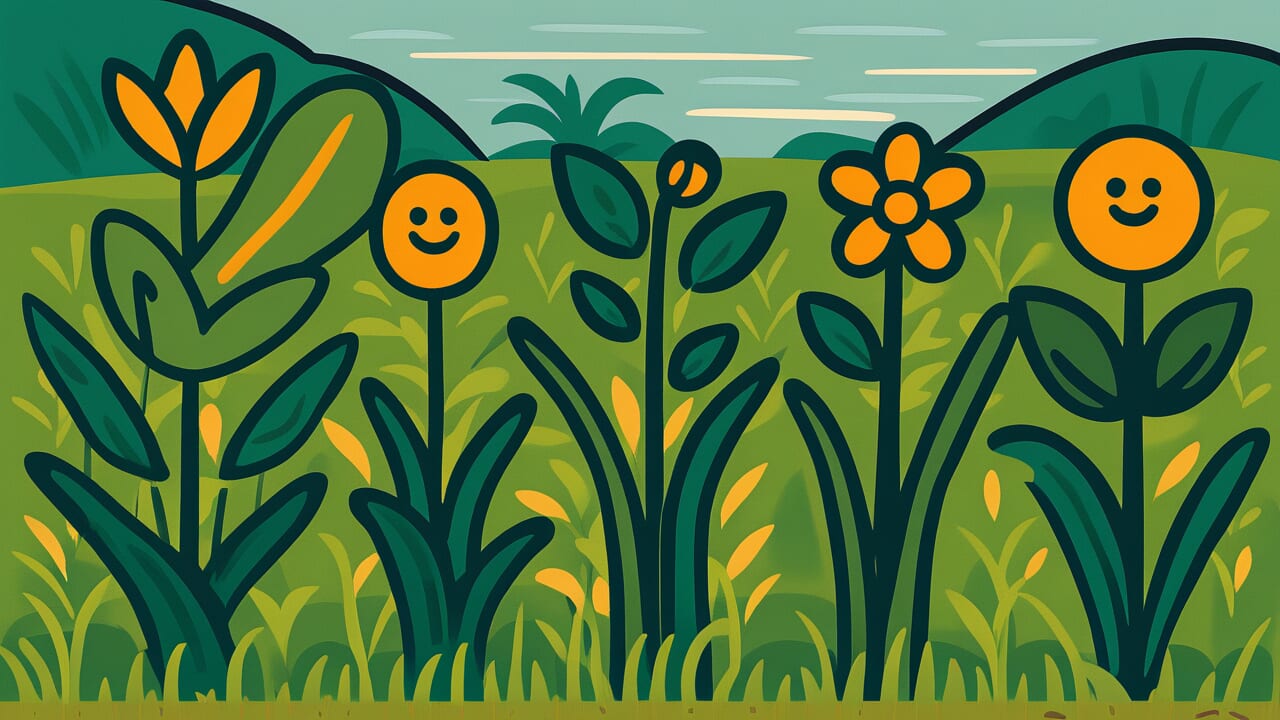How to Read “To associate with weeds”
Shūsō to go su
Meaning of “To associate with weeds”
“To associate with weeds” is a proverb that describes how wise people or noble individuals choose to spend time with ordinary people. The phrase paints a picture of someone with high intelligence or virtue who doesn’t become arrogant about their position or abilities.
Instead, they place themselves among common people.
This expression is used when praising someone with exceptional talent who remains humble. It also applies when evaluating high-ranking people who treat ordinary citizens without discrimination.
The reason for using this expression is to convey a value: true wise people don’t show off their excellence. Rather, they can stand at the same eye level as ordinary people.
In modern times, this saying offers rich insights for thinking about leadership styles. It also helps us consider the relationship between experts and general citizens.
The proverb expresses the virtue of people who don’t act superior despite having knowledge or status. They can interact with anyone as equals.
Origin and Etymology
Clear documentary records about the origin of “To associate with weeds” are limited. However, we can make interesting observations from the phrase’s components.
“Shūsō” literally means “many grasses.” Here it’s understood as an expression comparing ordinary people to grass.
In classical Chinese thought, there was a tradition of comparing excellent people to noble plants like “tall trees” or “orchids.” Meanwhile, ordinary people were compared to “grass.”
Grass grows low to the ground and exists everywhere. It became a symbol for the many people without special talents.
“Go su” is an old word meaning “to join a group” or “to associate with.” It derives from “go,” a military unit of five people. Originally it meant a group of five companions.
When these two parts combine, they create the meaning “a wise person places themselves among ordinary people.”
A strong theory suggests this phrase was used among Japanese intellectuals influenced by Confucian thought. It expressed the virtue of humility in excellent people and interaction beyond social status.
The phrase contains an Eastern value system that praises wise people who don’t become arrogant. They walk together with ordinary people.
Usage Examples
- The professor who talks casually with young people in the student cafeteria truly embodies “To associate with weeds”
- Even after success, that business leader never forgot “To associate with weeds” and listens to frontline employees from the same perspective
Universal Wisdom
The proverb “To associate with weeds” speaks to a fundamental question: what is true excellence? All humans are creatures who want to feel special when they achieve something, gain knowledge, or obtain a position.
We tend to create invisible walls between ourselves and others. We want to place ourselves in a high position.
However, this proverb has been passed down for so long because people understood something instinctively. Truly excellent people don’t need to show off their superiority.
They can face anyone as equals. Being able to place yourself among ordinary people who live close to the ground like grass is proof of true wisdom.
This wisdom shows a truth: human value isn’t about relative superiority or inferiority. It’s about your attitude toward how you relate to others.
Knowledge and status carry the danger of isolating people. That’s why our ancestors taught that those who climb high should be especially humble.
Everyone seeks recognition and wants to be respected. “To associate with weeds” understands this universal human desire.
It teaches us what kind of person truly deserves respect.
When AI Hears This
The competitive exclusion principle in ecology teaches that “two species competing for the same resources cannot coexist; one will always be excluded.” Yet in human society, this principle sometimes reverses.
Think of a school of fish. When thousands of fish swim in the same direction, predators find it hard to target specific individuals.
This is called the “dilution effect.” Blending into the group increases each individual’s survival probability. Not standing out and acting like the majority is actually an advanced survival strategy.
Similar mechanisms work in human society. When you show outstanding ability in an organization, you risk becoming a target of jealousy and attack.
Psychological research confirms that individuals who deviate from the group receive exclusion pressure. “To associate with weeds” can be interpreted as a strategy to avoid social attacks by deliberately not differentiating yourself.
This conserves energy.
What’s interesting is this contrast: in nature, resource competition promotes differentiation. In human society, competition for limited resources like evaluation and recognition promotes conformity instead.
This is a unique adaptation strategy born from the special environment of human sociality.
Lessons for Today
This proverb teaches you an important perspective: growth isn’t only about climbing upward. As we gain education, build careers, and deepen specialized knowledge, we unknowingly start feeling like special beings.
Then we distance ourselves from people we perceive as “below” us.
However, to live a truly rich life, you need the ability to connect with all kinds of people, no matter your position.
Being respected as an expert and being liked as a person aren’t separate things. Rather, being humble while having high ability multiplies your human appeal many times over.
In modern society, people tend to gather with similar others, whether on social media or at work. But try placing yourself among diverse people deliberately.
There you’ll find wisdom and perspectives you never knew existed.
The attitude of “To associate with weeds” is the key to growing yourself deeper and broader.



Comments